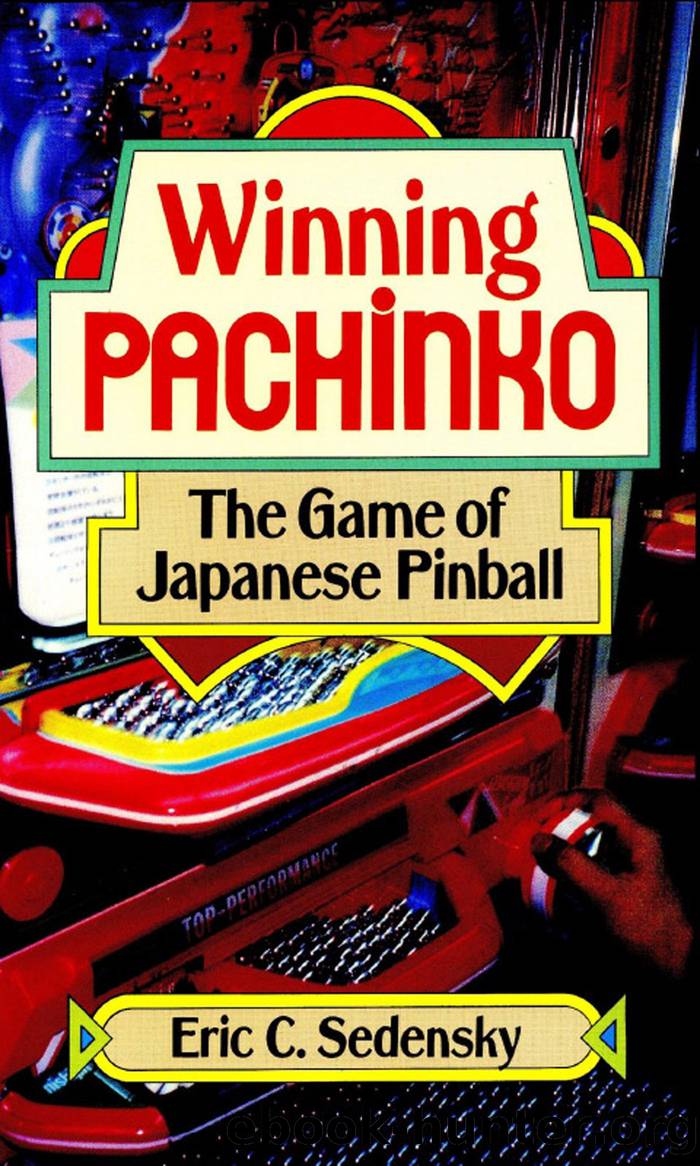Winning Pachinko by Eric Sedensky

Author:Eric Sedensky
Language: eng
Format: epub
ISBN: 978-1-4629-0431-0
Publisher: Tuttle Publishing
Another Word on Deji-pachi and Ippatsu-dai
As mentioned in Chapter One, deji-pachi and ippatsu-dai are similar enough to "regular" pachinko that it is not necessary to go into detail about how to read the nails on these machines. However, the playing technique is different enough to warrant a brief explanation.
Ippatsu-dai is easier to explain. One shot is all it takes to be a winner on this machine type, but suffice to say, a win almost never happens in "one shot." More than any other machine type, a steady hand and a sure eye are necessary to get that winning ball in the winning hole. Luck and timing also play a bigger role than usual. The majority of popular ippatsu-dai have several elaborate devices placed around the machine in a kind of chain. A ball first enters an upper area, rolls around or down, enters a second or third area, and then bounces down toward a penultimate scoring slot. If the ball enters that slot, it becomes the heralded ippatsu. After that the player has only to sit at the machine for ten more minutes shooting balls just about anywhere. Practically every ball will enter a scoring slot or one of the many open tulips, insuring a substantial payoff even to the lamest of players.
To further confuse matters, some ippatsu-dai even incorporate spinning number dials like deji-pachi. This makes the two types almost indiscernible to the novice. One sure way to tell the two apart is to drop in a few hundred yen. If the dials spin five or ten times, it is a deji-pachi machine. If they spin two or three times, it is ippatsu-dai.
Ippatsu-dai is a technician's game, but deji-pachi is a game of percentages. This is the game for gamblers. The object with deji-pachi is to have a winning number combination come up on the spinning (or flashing) number dials. The machine will then go uchi-dome. This is purely a matter of odds, something most players don't realize. The computer in a deji-pachi machine is programmed as a random number generator. That means that most number combinations come up totally based on the odds. A winning combination, however, is programmed to come up sooner or later.
Download
This site does not store any files on its server. We only index and link to content provided by other sites. Please contact the content providers to delete copyright contents if any and email us, we'll remove relevant links or contents immediately.
Rogue Ascension: Book 1: A Progression LitRPG by Hunter Mythos(691)
How to Play Poker for Beginners - Learn the Strategy, Fundamentals, Psychology, Game Theory, Math & Advanced Systems by Derick Crawford(586)
Rune Seeker by J. M. Clarke(505)
Resident Evil: Extinction by Keith R. A. Decandido(503)
Resident Evil: Extinction by Keith R. A. DeCandido;(471)
Corruption and Centinels: A Monster Evolution LitRPG (Salvos, Book 5) by V.A. Lewis(464)
Wake of the Ravager by Macronomicon(459)
Tribe: A Harem Fantasy by Dade Crawford(457)
The Ultimate True Crime Trivia Book: A Compilation of Fascinating Facts & Disturbing Details About Infamous Serial Killers, Mysteries, Cold Cases & Everything In Between by Seven True Crime(457)
Unexpected Healer: A Fantasy LitRPG Isekai Adventure (Earthen Contenders Book 1) by Jonathan Brooks(446)
Unaffiliated Healer: A Fantasy LitRPG Isekai Adventure by Jonathan Brooks(434)
Primordial Ascension: A LitRPG Adventure (Sybil, Book 1) by Azrie(432)
S.T.Y.X. SHOWDOWN (S.T.Y.X. Humanhive Book 4) by Arthur Stone(432)
Dawn of the Aspects: Part IV by Richard A. Knaak(416)
Scrambled Lives: A LitRPG Novel by Rue Vespers(416)
Leveling Up The World: A LitRPG Adventure by L. Eclaire(403)
Mark of the Crijik 2: Koshima Academy: A LitRPG Adventure by ThinkTwice(397)
The Middang3ard Complete Boxed Set: A Portal GameLit Fantasy by Ramy Vance & Michael Anderle(389)
Horde: An Army Building LitRPG LitRTS Series (I Don't Want to be the Hive Queen Book 2) by ValetheHowl(377)
